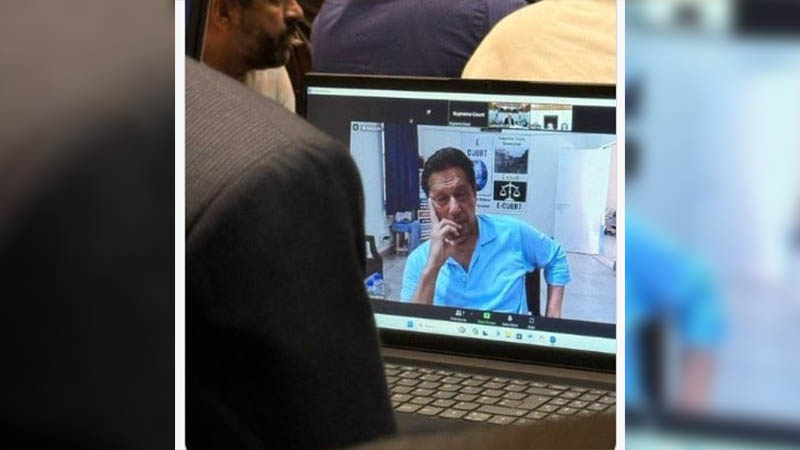Former Prime Minister Imran Khan, through a video link, interacted with Chief Justice of Pakistan (CJP) Qazi Faez Isa, requesting the fixation of two crucial petitions. These petitions address alleged human rights violations and purported massive rigging during the February 8 elections.
Key requests by Imran Khan
During the interaction, which marked a notable moment in the judicial proceedings, Imran Khan, dressed in a navy blue shirt, presented three primary requests before the bench led by CJP Isa:
- Supervision of jail affairs: Imran Khan complained about a military officer overseeing jail affairs, complicating access to his legal team. He specifically asked for a meeting with Khawaja Haris, his previous counsel.
- Legal representation for party workers’ violation petition: Khan sought the fixation of a petition concerning the alleged mistreatment of PTI workers post the May 9 incidents. CJP Isa inquired about his legal representation, to which Khan responded that Hamid Khan was his counsel. The Chief Justice assured that Hamid Khan, being a senior counsel, would know how to address the matter.
- Alleged rigging during February 8 elections: Labelling the election rigging as the “biggest robbery” of the people’s mandate, Khan highlighted that their petition on this issue was pending. CJP Isa encouraged him to address this matter separately as the court was focussed on the NAB law amendments case.
Courtroom dynamics and decisions
Despite a request from the Khyber Pakhtunkhwa (KP) government for live streaming the NAB law amendments case, the Supreme Court, in a 4-1 majority decision, declined this request. CJP Isa deemed the matter too technical for live streaming, while Justice Athar Minallah dissented, arguing it was of public interest.
The Supreme Court’s decision drew mixed reactions. Some lawyers expressed disappointment, suggesting the court failed to dispel perceptions of external influence. They emphasised the need for the judiciary to project independence, especially in high-profile cases involving political figures like Imran Khan.
Enhanced security and judicial independence
On Thursday, heightened security measures were observed around the Supreme Court premises, with three checking spots established. This heightened security underscored the case’s sensitivity and the broader political implications.
Senior lawyers noted that the primary challenge for the apex court, under CJP Isa’s leadership, is to maintain and project judicial independence. This sentiment was echoed following a letter from six Islamabad High Court judges, calling on the Supreme Court to ensure its proceedings remain free from executive influence.
Justice Minallah, addressing concerns over perceived judicial compromises, asked Attorney General for Pakistan Mansoor Awan to inform Prime Minister Shehbaz Sharif that the judiciary remains independent and devoid of “black sheep.” If any such individuals exist, the prime minister should move a reference against them. Notably, CJP Isa remained silent on this matter, not endorsing the concerns raised by Justices Minallah and Jamal Khan Mandokhail.
Government’s legal setback
The current government faced a setback when its counsel, Makhdoom Ali Khan, and Senator Farooq H Naek, refrained from defending the recently promulgated ordinance extending remand tenure from 14 to 40 days. The bench has shown an inclination to endorse Justice Syed Mansoor Ali Shah’s minority view, suggesting that NAB law applies to judges and generals.
